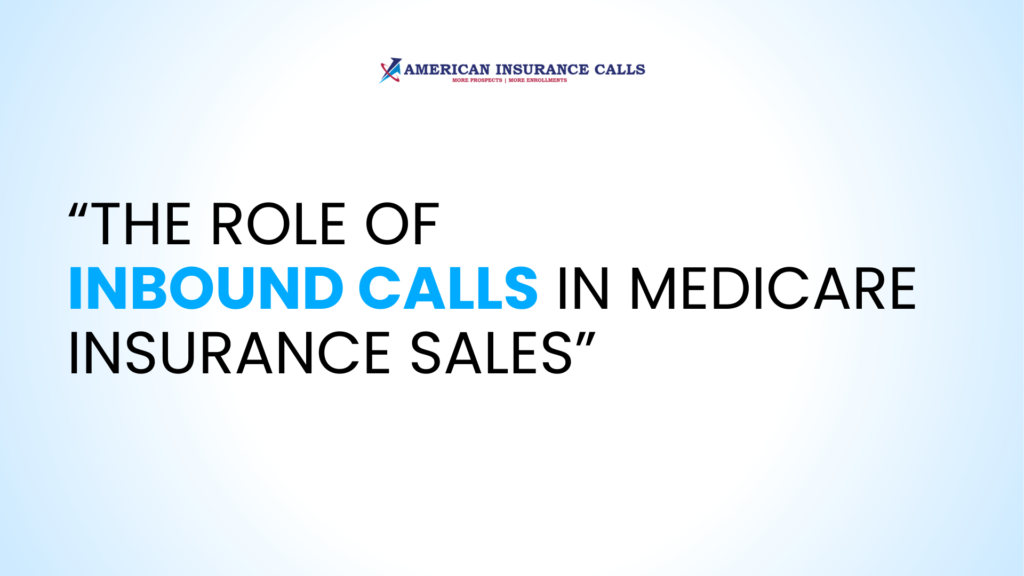In the competitive landscape of Medicare insurance sales, connecting with high-intent prospects is critical. Among the many lead generation strategies available, inbound calls stand out as one of the most effective tools for driving conversions. These calls come directly from prospects actively seeking Medicare information, making them a powerful resource for insurance agents. This article explores the importance of inbound calls, their advantages, and how agents can optimize this channel to grow their Medicare business.
What Are Inbound Calls in Medicare Insurance Sales?
Inbound calls refer to phone inquiries initiated by prospective clients who are actively seeking Medicare plans, such as Medicare Advantage, Medicare Supplement (Medigap), or Part D prescription drug plans. These calls can be generated through various marketing efforts, including:
- Pay-per-call campaigns
- Google Ads
- Social media advertisements
- Organic search traffic
- Direct mail campaigns
Unlike outbound calls, where agents contact leads who may not be ready to make a decision, inbound calls connect agents with prospects who have already shown interest, making them highly valuable.
Why Inbound Calls Are Crucial in Medicare Insurance Sales
1. High-Intent Prospects
Prospects who make inbound calls are actively searching for Medicare solutions. This level of intent is a significant advantage as it increases the likelihood of conversion. These individuals are typically ready to enroll in a plan, switch their existing coverage, or explore options for better benefits.
2. Personalized Interaction
Inbound calls allow agents to engage in real-time, personalized conversations with prospects. This direct interaction helps agents:
- Understand the specific needs of the caller.
- Offer tailored recommendations.
- Build trust through clear communication.
This personal touch is often the key to closing sales, especially in a market as complex as Medicare.
3. Faster Sales Cycle
The urgency of the prospect’s inquiry often leads to quicker decision-making. Compared to other lead generation methods, inbound calls can significantly shorten the sales cycle, allowing agents to close deals faster and more efficiently.
4. Higher Conversion Rates
Inbound calls typically yield higher conversion rates because the leads are self-qualified. By the time prospects pick up the phone, they are already interested in learning more or making a purchase. This reduces the need for extensive persuasion and follow-up.
5. Cost-Effective Lead Generation
While generating inbound calls requires upfront investment in marketing campaigns, the quality of these leads often results in better ROI compared to outbound cold-calling or shared lead purchases.
How Inbound Calls Enhance the Medicare Sales Process
1. Building Trust
Medicare is a complex and often confusing topic for seniors. Inbound calls give agents an opportunity to educate prospects, address concerns, and provide clear guidance. This trust-building process is crucial for converting inquiries into loyal clients.
2. Addressing Immediate Needs
Many Medicare prospects call because they have urgent questions or specific needs, such as:
- Understanding Medicare Advantage benefits.
- Comparing Medigap policies.
- Clarifying prescription drug coverage.
Agents who can provide immediate, accurate answers are more likely to secure the sale.
3. Reducing Competition
Inbound calls often bypass the competitive bidding process seen with shared leads. Prospects who directly contact your agency are less likely to be speaking with multiple agents, giving you a distinct advantage.
How to Generate Inbound Calls for Medicare Insurance Sales
1. Pay-Per-Call Advertising
Pay-per-call campaigns target high-intent prospects searching for Medicare information online. Platforms like Google Ads and Bing Ads allow you to bid on keywords such as:
- “Medicare Advantage plans near me.”
- “Compare Medicare Supplement plans.”
- “Best Medicare Part D options.”
These campaigns connect prospects directly to your agency via phone.
2. Organic Search Optimization
Optimizing your website for Medicare-related keywords can drive organic traffic and encourage prospects to call. Include clear call-to-action (CTA) buttons such as “Call Now” or “Speak with a Medicare Expert” on your website.
3. Social Media Marketing
Platforms like Facebook and Instagram allow you to target Medicare-eligible individuals and their caregivers with ads that feature clickable call buttons.
4. Direct Mail Campaigns
Direct mail remains an effective method for reaching seniors. Include your phone number prominently in your mailers and encourage recipients to call for more information.
5. Local Outreach
Partner with local senior centers, health fairs, or community organizations to generate interest and drive inbound calls.
Best Practices for Handling Inbound Calls
Generating inbound calls is only part of the equation. To maximize their value, agents need to handle these calls effectively:
1. Be Prepared
Have detailed information about Medicare plans readily available. Familiarize yourself with the benefits, costs, and coverage options for each plan you offer.
2. Listen Actively
Understand the caller’s needs before jumping into sales pitches. Ask open-ended questions like:
- “What are you looking for in a Medicare plan?”
- “Do you have specific coverage concerns?”
- “Have you reviewed your current plan’s benefits recently?”
3. Build Rapport
Show empathy and patience when addressing concerns. Medicare is a critical decision for seniors, and they value agents who take the time to explain options clearly.
4. Use Call Scripts
Develop scripts to guide conversations while allowing flexibility for personalization. A well-structured script ensures you cover all important points while maintaining a natural flow.
5. Follow Up
Not all prospects will make a decision during the initial call. Follow up with personalized emails or calls to address any lingering questions and keep the conversation going.
Tracking and Measuring Success
To optimize your inbound call strategy, track key performance metrics, such as:
- Call Volume: The number of inbound calls received.
- Conversion Rate: The percentage of calls that result in enrollments.
- Average Call Duration: Longer calls often indicate higher engagement and interest.
- Cost Per Call: Evaluate the efficiency of your marketing spend.
- Customer Satisfaction: Use surveys to gauge the quality of your service.
Analyzing these metrics helps you refine your campaigns and improve your results.
Challenges of Inbound Calls and How to Overcome Them
While inbound calls offer numerous benefits, they come with challenges:
- Call Volume Management: High call volumes during enrollment periods can overwhelm agents. Use call routing and scheduling tools to handle inquiries efficiently.
- Regulatory Compliance: Medicare marketing is highly regulated. Ensure all calls follow CMS guidelines to avoid penalties.
- Missed Opportunities: Unanswered calls result in lost leads. Invest in call answering services or automated systems to ensure every call is attended to.
Conclusion
Inbound calls are a game-changer for Medicare insurance sales, connecting agents with high-intent prospects actively seeking coverage. By leveraging pay-per-call campaigns, optimizing your digital presence, and providing excellent customer service, you can maximize the value of inbound calls and grow your Medicare business.
With the demand for Medicare plans increasing every year, incorporating inbound call strategies into your marketing efforts is a must. When handled effectively, inbound calls can streamline your sales process, boost conversion rates, and help you build lasting relationships with your clients.

